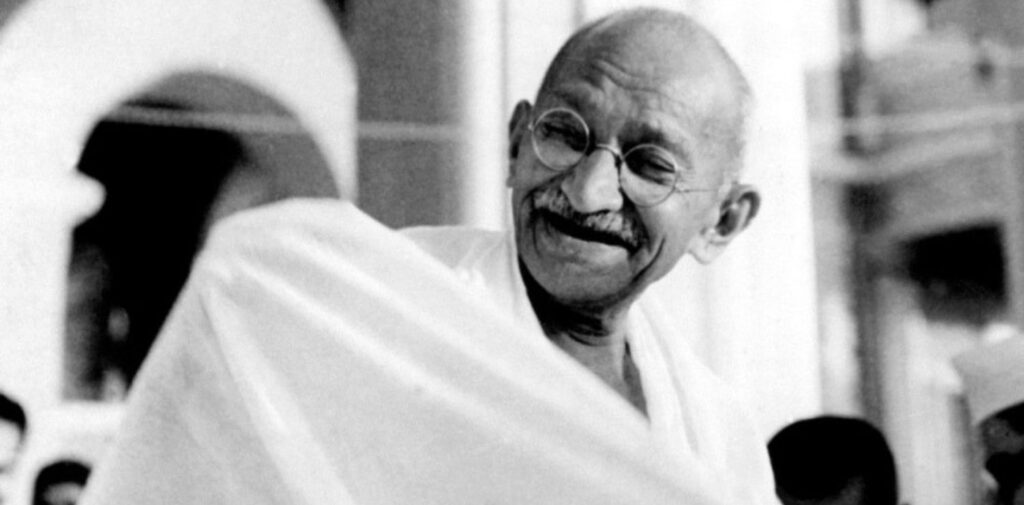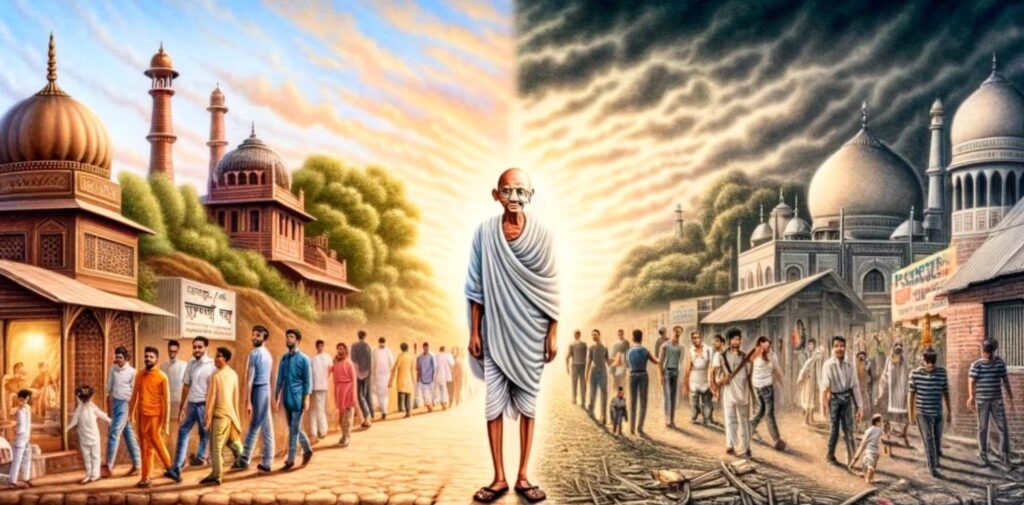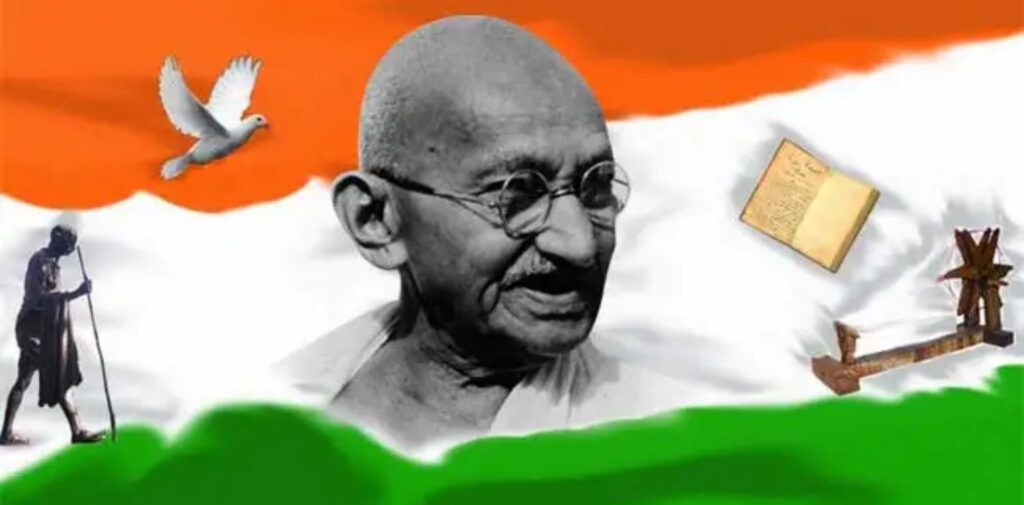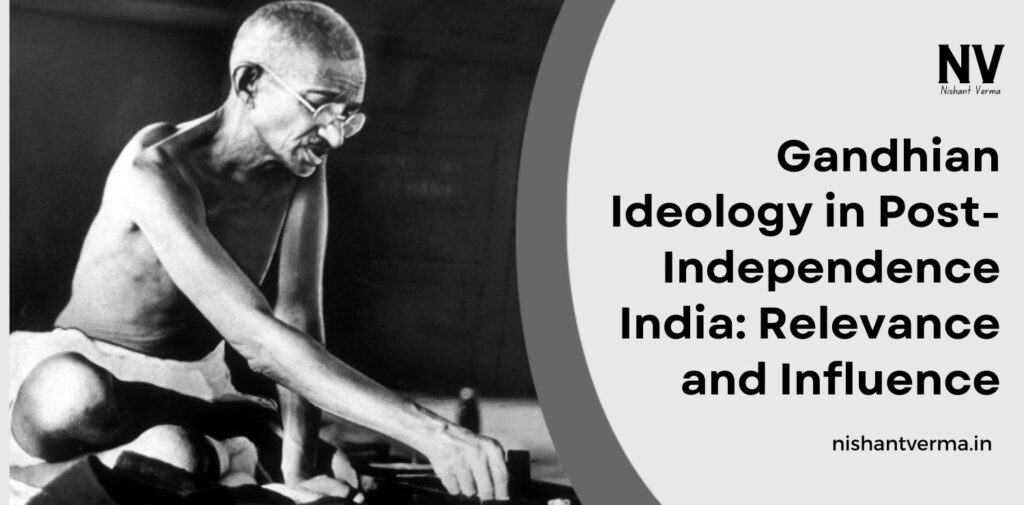The Gandhian ideology, inspired by Mahatma Gandhi, has played a significant role in shaping the social, political, and cultural landscape of post-independence India. Although Gandhi’s principles were primarily focused on the struggle for independence, their influence continues to be felt long after India gained freedom in 1947. His teachings of non-violence (ahimsa), truth (satya), self-reliance (swadeshi), and simple living have had a lasting impact on Indian society, politics, and governance. In this article, we will explore the relevance of Gandhian ideology in post-independence India, its enduring influence, and the challenges of applying it in the modern world.
Gandhi’s Core Ideologies
Before understanding the role of Gandhian principles in post-independence India, it’s essential to know the core values that Gandhi propagated:
- Non-Violence (Ahimsa): Gandhi firmly believed that non-violence was the most powerful tool for social and political change. This philosophy encouraged peaceful protests, civil disobedience, and a rejection of violent methods to resolve conflicts.
- Truth (Satya): For Gandhi, truth was not just about honesty in words; it was about living a life of integrity and righteousness. His concept of truth emphasized moral conduct, personal accountability, and the pursuit of justice.
- Self-Reliance (Swadeshi): Gandhi promoted the idea of economic self-reliance, advocating for the use of Indian-made goods and the boycott of foreign goods, particularly British products during the colonial era. He believed that self-reliance would help India become economically strong and independent.
- Simple Living and High Thinking: Gandhi advocated for a life of simplicity, where individuals focused on fulfilling their basic needs rather than accumulating wealth or material possessions. He believed that living a life of contentment and spiritual fulfillment was more important than pursuing material success.
- Sarvodaya (Welfare of All): Gandhi’s idea of social justice was based on the welfare of all people, especially the marginalized sections of society. He believed in the upliftment of the Dalits (whom he called Harijans), women, and other underprivileged communities.

The Influence of Gandhian Ideology in Post-Independence India
Although Mahatma Gandhi’s direct influence waned after his assassination in 1948, his ideologies continued to shape the policies, social movements, and mindset of post-independence India. Below are some key areas where Gandhian principles have left a profound impact:
1. The Concept of Nation-Building
After India achieved independence, the country was faced with the enormous task of rebuilding a fragmented and diverse society. Gandhian ideology played a central role in shaping the moral and ethical foundations of the newly independent nation. Leaders such as Jawaharlal Nehru and Sardar Patel, while moving forward with modern and industrialized visions for the country, were also influenced by Gandhi’s emphasis on rural development, self-sufficiency, and unity in diversity.
For example, Gandhi’s focus on rural development and empowerment of village communities led to the establishment of numerous programs aimed at rural upliftment. The idea of “Gram Swaraj” (village self-rule) inspired various government initiatives for village reconstruction and sustainable rural development.
2. Peaceful Struggles and Social Movements
Gandhi’s principle of non-violence became the foundation for various peaceful movements in post-independence India. One notable example is the Chipko Movement in the 1970s, where villagers embraced non-violent methods to prevent the felling of trees. This movement reflected Gandhian principles of non-violence, environmental conservation, and community-based action.
Similarly, the Bhoodan Movement, initiated by Vinoba Bhave, who was deeply inspired by Gandhi, focused on the voluntary donation of land by landlords to the landless. This was a reflection of Gandhi’s vision of a just and equitable society.
3. Emphasis on Simple Living and Sustainability
In an era of rapid industrialization and consumerism, Gandhi’s teachings on simple living remain relevant in addressing today’s environmental and economic challenges. Gandhi’s idea of swadeshi (promoting self-sufficiency through local industries) continues to inspire initiatives related to sustainability, eco-friendly practices, and the promotion of handmade and locally produced goods.
In modern India, there has been a growing movement towards organic farming, sustainable living, and the promotion of indigenous products, all of which resonate with Gandhi’s emphasis on self-reliance and simplicity.

4. Promotion of Social Justice and Equality
Gandhi’s unwavering commitment to social justice had a lasting effect on the progress of marginalized communities in India. His focus on eradicating untouchability, supporting women’s rights, and promoting the welfare of backward classes paved the way for various social justice movements in post-independence India.
Legislations such as the Untouchability (Offences) Act, 1955, the Prohibition of Child Marriage Act, 1929, and the Indian Constitution, which guarantees equality to all citizens, can be seen as part of the Gandhian legacy of striving for a just society.
5. Gandhi’s Influence on Indian Politics and Leaders
Although the political leadership of post-independence India was dominated by figures like Jawaharlal Nehru, Indira Gandhi, and others, the values of Gandhian thought often influenced the direction of India’s politics. For example, Indira Gandhi’s focus on the Green Revolution to ensure food security and economic growth was rooted in Gandhian principles of self-reliance.
The Gandhian approach to politics also found resonance in the Swatantra Party, led by C. Rajagopalachari, who sought to emphasize the importance of individual liberty, rural empowerment, and local governance.
6. Promotion of Non-violence in International Relations
India’s foreign policy, particularly under Nehru, was influenced by Gandhi’s ideals of non-violence and peace. The Non-Aligned Movement (NAM), founded in the 1960s, sought to avoid alignment with any major world power bloc, emphasizing peaceful coexistence and mutual respect among nations. This policy of non-alignment reflected Gandhi’s global vision of peaceful diplomacy and justice in international relations.

Challenges in Applying Gandhian Ideology Today
While Gandhian principles have been influential, the application of these ideas in modern India has not been without challenges:
- Urbanization and Modernization: With rapid urbanization, industrialization, and technological advancement, many of Gandhi’s ideals, such as simple living and rural self-reliance, seem increasingly difficult to apply in urban settings. The focus on material wealth and development sometimes clashes with the Gandhian vision of living modestly.
- Political Realities: The complexities of modern politics, with its focus on economic growth and global competitiveness, often conflict with Gandhian ideals of non-violence, simple living, and moral leadership. In today’s political environment, electoral pressures and the pursuit of power can overshadow the ethical considerations advocated by Gandhi.
- Globalization: The forces of globalization, which encourage interconnectedness and the dominance of multinational corporations, pose a challenge to Gandhi’s concept of self-sufficiency and local economies. The emphasis on global trade and the spread of consumer culture seem to contradict his vision of sustainable, community-oriented living.
Conclusion
Gandhi’s teachings continue to hold a unique and powerful place in the Indian consciousness. His principles of non-violence, truth, and social justice have shaped the values of post-independence India and continue to inspire social and political movements across the country. However, applying these ideals in today’s rapidly changing world is not without its challenges. Despite these challenges, Gandhi’s vision of a just, non-violent, and self-sufficient society remains a beacon for those who seek to balance modern development with ethical principles.
In the end, Gandhian ideology is not just a relic of the past but a living legacy that continues to shape India’s future, helping guide the country toward a more inclusive, compassionate, and sustainable path.




